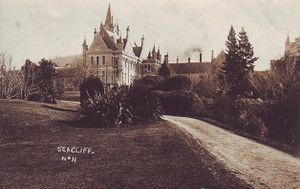Difference between revisions of "Blake-Palmer Geoffrey"
(→Geoffrey Blake-Palmer 1909-1980) |
|||
| Line 1: | Line 1: | ||
== Geoffrey Blake-Palmer 1909-1980== | == Geoffrey Blake-Palmer 1909-1980== | ||
Blake-Palmer was a medical doctor with an interest in anthropology and particularly archaeology. He was born and trained in Britain, coming to New Zealand in 1935. His medical career was a distinguished one in mental health, being superintendant of Tokanui Mental Hospital, [http://en.wikipedia.org/wiki/Seacliff_Lunatic_Asylum Seacliff Mental Hospital]near Dunedin and ending his career as Director General of Mental Health in Wellington, retiring in 1973. In that position he was instrumental in starting the trend to deinstitutionalisation of mental patients. | Blake-Palmer was a medical doctor with an interest in anthropology and particularly archaeology. He was born and trained in Britain, coming to New Zealand in 1935. His medical career was a distinguished one in mental health, being superintendant of Tokanui Mental Hospital, [http://en.wikipedia.org/wiki/Seacliff_Lunatic_Asylum Seacliff Mental Hospital]near Dunedin and ending his career as Director General of Mental Health in Wellington, retiring in 1973. In that position he was instrumental in starting the trend to deinstitutionalisation of mental patients. | ||
| − | + | [[Image:Seacliff.jpg|thumb]] | |
He was in the army medical corps in WW2 with the [http://en.wikipedia.org/wiki/New_Zealand_Expeditionary_Force 2NZEF], serving in Greece, Crete, North Africa and Italy. He was awarded the Greek Silver Cross. Late in the war he was involved in radio broadcasts to troops about Italian history. A book resulted (Blake-Palmer 1945) which is a guide to the classical archaeology, history, historic buildings and geography of central and southern Italy - with occasional public health notes. It was researched from publications in Italian. | He was in the army medical corps in WW2 with the [http://en.wikipedia.org/wiki/New_Zealand_Expeditionary_Force 2NZEF], serving in Greece, Crete, North Africa and Italy. He was awarded the Greek Silver Cross. Late in the war he was involved in radio broadcasts to troops about Italian history. A book resulted (Blake-Palmer 1945) which is a guide to the classical archaeology, history, historic buildings and geography of central and southern Italy - with occasional public health notes. It was researched from publications in Italian. | ||
Revision as of 13:58, 26 September 2008
Geoffrey Blake-Palmer 1909-1980
Blake-Palmer was a medical doctor with an interest in anthropology and particularly archaeology. He was born and trained in Britain, coming to New Zealand in 1935. His medical career was a distinguished one in mental health, being superintendant of Tokanui Mental Hospital, Seacliff Mental Hospitalnear Dunedin and ending his career as Director General of Mental Health in Wellington, retiring in 1973. In that position he was instrumental in starting the trend to deinstitutionalisation of mental patients.
He was in the army medical corps in WW2 with the 2NZEF, serving in Greece, Crete, North Africa and Italy. He was awarded the Greek Silver Cross. Late in the war he was involved in radio broadcasts to troops about Italian history. A book resulted (Blake-Palmer 1945) which is a guide to the classical archaeology, history, historic buildings and geography of central and southern Italy - with occasional public health notes. It was researched from publications in Italian.
Blake-Palmer was President of the New Zealand Archaeological Association in 1963 and 1964.
His aerial photography paper was inspired by pioneering work in Britain. He corresponded with Antiquity editor O G S Crawford while writing the paper. The Otago coastal site excavation he published is close to Seacliff. It was an eroding coastal midden on which Blake-Palmer undertook what we would today call a rescue excavation. He served on the council of the Dunedin City Art Gallery and Management Committes of Otago Museum and the Dominion Museum - now Te Papa. He gave the Thomas Cawthron Memorial Lecture in 1962, on mental health.
His great contribution to New Zealand literature was to cancel a lobotomy operation scheduled for Janet Frame.
Obituary: 1981 New Zealand Medical Journal 93:56.
Bibiliography (Not including medical papers)
History:
1940 The Birth, Growth and Death of a Legend. Transactions and Proceedings of the Royal Society of New Zealand 69:165-181.
1945 Italian Journey Oswald-Sealy, Auckland.
Archaeology:
1947 New Zealand Archaeology and Air Photography, Journal of the Polynesian Society 56:233-41.
1951 Research of Earthworks, Journal of the Polynesian Society 60:53-54.
1956 An Otago Coastal Occupation Site With Dinornis Remains. Journal of the Polynesian Society 65:161-63.
1958 Henry Devenish Skinner — An Appreciation, Journal of the Polynesian Society 67:97-103. (H D Skinner)
Anthropology:
1946 Mana — Some Christian and Moslem Parallels, Journal of the Polynesian Society 55:263-76.
1954 Tohungaism and Makutu. Some Beliefs and Practices of the Present Day Maori, Journal of the Polynesian Society 63:147-63.
1963 Maori Patients in Mental Hospitals, Journal of the Polynesian Society 72:420.
